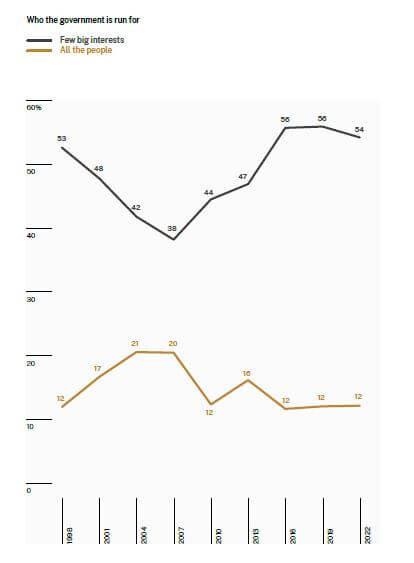Aside from their annual survey of Australians’ political sentiments, the ANU also released a report last week on how those sentiments have shifted over the past 35 years.
The study’s findings confirm the notion that support for the major parties has continued deteriorating. The largest difference in electoral behaviour is the change in people who say they always vote for the same party. In 1987, 72% claimed to do so, falling to just 37% in 2022. The trend is shared by voters who lean left and those who lean right.
This also signifies a change in people’s degree of political commitment. Since 1987, 14% less Australians say they have made up their mind going into the election campaign, down to 36% in 2022. This is now equal to the percentage who say they make up their minds during the campaign
The general decrease in party loyalty also means less people using how-to-vote cards. In 1987, 56% of voters followed them compared with 31% in 2022.
However, the survey results suggest this change is specifically a disillusionment with major parties, rather than with a disinterest in politics in general. For example, “satisfaction with democracy” and the notion that “who people vote for can make a big difference” are roughly equivalent to levels in the 1990s. Likewise, roughly as many Australians (70%) believe politicians “look out only for themselves” as did in the period 1993-2001.
So the idea that these changes are the product of generational apathy rather than specific disapproval of major parties is probably misguided.

Just as in the 1990s, most Australian voters see the country’s financial situation as having worsened over the previous year. Two-thirds of voters have this perception, a proportion that has not been topped since 1990.
Similarly, 41% of voters say their household’s financial situation has become worse. Again, only in 1990 did more voters have this negative perception. Just 21% of voters expect their households finances to improve over the coming year.
The similarities in perceptions of democratic politics and the economic climate between now and the 1990s reflect the truism that prosperity breeds apathy and economic hardship forces us to pay attention to political leadership.
Finally, conservative moral positions continue to slide in support. In 2022, 73% of voters support the right to abortion as opposed to 39% in 1987. Half of voters support decriminalising marijuana compared to a third in 1990. And 27% of Australians now claim that indigenous people receive too much government help, down from 55% in 1990 and a peak of 61% in 1996.
Follow Christian on Twitter for more news updates.
Sign Up To Our Free Newsletter